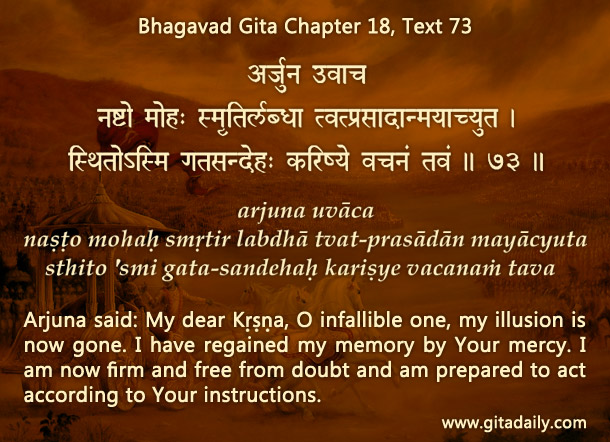Arjuna’s last words in the Bhagavad-gita are: “I will do your will.” (18.73: karishye vachanam tava). What do they tell us about Krishna’s message? That it is both personal and universal.
Personal: The Gita is an intimate discussion between two persons, Krishna and Arjuna. This truth, though self-evident in the Gita’s overall context, can easily get overlooked when we probe its complex philosophical content. Lest anyone infer that some impersonal absolute is the ultimate object of surrender, Arjuna’s last words unequivocally rebut that inference: having been freed from illusion (18.73: nashto moha), he uses the unambiguous second-person reference (18.73: tava) to emphatically assert that he is choosing to harmonize with Krishna, the Divinity standing in front of him, not anything else. Lest Gita readers get lost in a metaphysical maze, Arjuna’s last words bring readers back to the personal implications of the Gita’s message: a personal declaration by humanity to harmonize with divinity.
Universal: Given that the Gita is spoken on a battlefield, it is significant that Arjuna doesn’t conclude, “I will fight.” Though he does fight after the Gita ends, his words highlight that he has understood the universality of the Gita’s message: it is not just a call to fight; it is a call to harmonize with the Divine. Arjuna’s last words reflect his enlightened self-understanding: he doesn’t see himself merely as a reluctant kshatriya who has resolved to do his martial duty; he sees himself as an eternal part of the Supreme Whole, Krishna (15.07) who has consciously committed to align himself with Krishna’s will. These twin truths — enlightened self-understanding and voluntary wholehearted harmonization with the Divine — constitute the Gita’s trans-contextual message. Such are the Gita’s universal principles for living that have inspired millions for millennia and will continue to do so.
One-sentence summary:
Arjuna’s last words convey that the Gita’s core message is both personal and universal: establishing a personal connection between humanity and divinity; and equipping humanity with universal principles for living in harmony with divinity.
Think it over:
- How is the Gita’s message personal?
- How is the Gita’s message universal?
- Which implication of Arjuna’s last words resonate with you?
***
18.73: Arjuna said: My dear Krishna, O infallible one, my illusion is now gone. I have regained my memory by Your mercy. I am now firm and free from doubt and am prepared to act according to Your instructions.
To know more about this verse, please click on the image


Hare Krishna,
Prabhu ji, Thank You very much – this is wonderful text, wonderfully written, very lyrical and easily understood.
Yes, this is about centring oneself after bewildering emotions.
Ys,
Thanks for your consistent and thoughtful comments.
P.S. This is soul food that I`ve been longing to hear.
…He is so unintelligent that he does not think that if he were God, then how could he be in doubt? That he does not consider. So that is the last snare of illusion. Actually to become free from the illusory energy is to understand Kṛṣṇa, the Supreme Personality of Godhead, and agree to act according to His order.